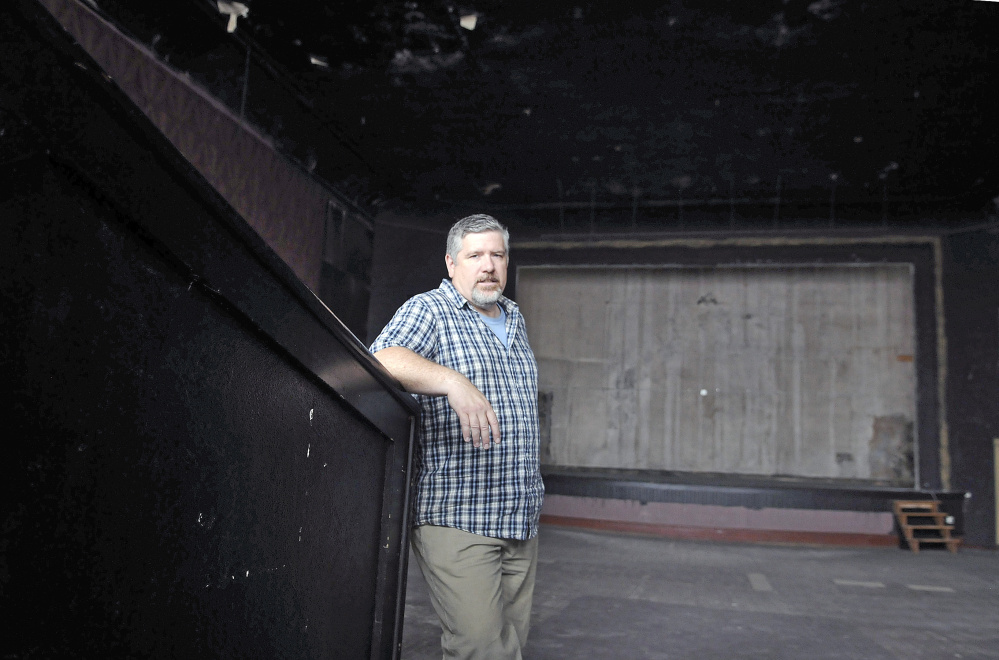GARDINER — City elected officials voted Wednesday to allocate $150,000 as a leadership gift to Johnson Hall for its renovation project, with the stipulation that the money won’t be transferred until the construction contract for the project is signed.
The decision comes as board members at the historic downtown Gardiner theater are working to secure pledges and gifts needed to pay for the $4.6 million renovation of the opera house’s upper floors.
If the current schedule holds, the work will be completed in 2019.
The vote came after two rounds of public hearings and debate. In the end, the vote was 7-1, with District 2 Councilor Philip Hart voting against the measure. More residents spoke in favor of the gift during the two public hearings than spoke against it.
Hart said people had thanked him for speaking out a week ago on behalf of taxpayers who struggle to pay their property taxes at the city’s first public hearing on the proposal.
“They still believe that taxpayers have given their fair share,” he said.
Gardiner city officials give annual support to Johnson Hall, a nonprofit, with a $25,000 contribution that helps defray operational expenses.
“If we didn’t have this, we wouldn’t have a tax increase this year,” he said. That money could be used to fund requests for vehicles that will probably be deferred a year or more.
Hart said he’d be willing to make a personal donation to the theater, and acknowledged it was hard to speak out against a project that is backed by two people he had served on the City Council with — Johnson Hall board president Andrew MacLean and Logan Johnston.
“If I called you for help, you both would be there in five minutes,” he said.
Trina and Dave Rideout, who live in rural Gardiner, both spoke out against the gift at the public hearing. Trina Rideout said she thinks taxes could be spent on other things, not this, and Dave Rideout asked whether the city makes these kinds of gifts to other Gardiner businesses.
“Many communities have understood arts are an economic driver,” Mayor Thom Harnett said. “Augusta is pledging a much larger sum to a theater that is not as well developed or sustaining as Johnson Hall.”
In October, the Augusta City Council pledged $300,000 to help restore the Colonial Theatre, which has been closed for more than four decades. That money will be paid when the project is substantially complete and a certificate of occupancy is issued. That theater also is expected to be completed in 2019. Its projected budget is about $8.5 million.
Gardiner, Harnett said, will see a huge return on the project, which he expects to be a strong economic driver, not just next year and the year after, but in 10 and 20 years.
This leadership gift is expected to spur other gifts to pay for the project.
Because the Johnson Hall board is using the sale of historic tax credits, the theater will be owned by a for-profit entity for five years.
City Manager Scott Morelli did a rough calculation on the theater’s possible taxable value during that time; it could generate $183,000 in taxes based on its new incremental value over five years, but that doesn’t account for any credit enhancement agreements that might be negotiated.
Morelli has recommended that the City Council approve the request, but it was not based on the thought that it would be a loan.
“I understand where (Councilor Philip Hart’s) questions come from,” he said.
He’s not sure he would have made the same recommendation five years ago.
“I have 100 percent come to believe that community development and economic development are intertwined,” he said. “To have economic development, you have to have community development. It will have enormous ripple effects in the city, and not just be an investment in the theater.”
In other cities where historic theaters have been restored, the value of the buildings around the theaters has increased, and business activity was boosted.
“I would stake quite a bit that you will very quickly see a return on investment,” he said. “If you play the long game, you can afford things like plow trucks.”
The money would come from the city’s undesignated fund balance. If no construction contracts are signed, the money would not be paid out.
Jessica Lowell — 621-5632
Twitter: @JLowellKJ
Send questions/comments to the editors.



Success. Please wait for the page to reload. If the page does not reload within 5 seconds, please refresh the page.
Enter your email and password to access comments.
Hi, to comment on stories you must . This profile is in addition to your subscription and website login.
Already have a commenting profile? .
Invalid username/password.
Please check your email to confirm and complete your registration.
Only subscribers are eligible to post comments. Please subscribe or login first for digital access. Here’s why.
Use the form below to reset your password. When you've submitted your account email, we will send an email with a reset code.